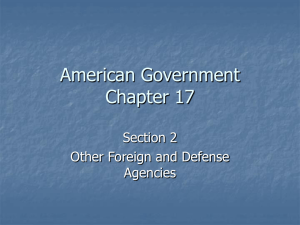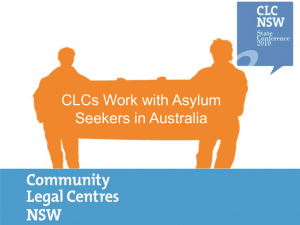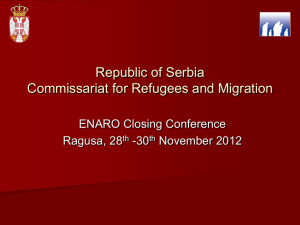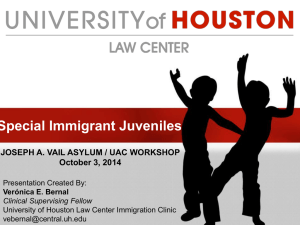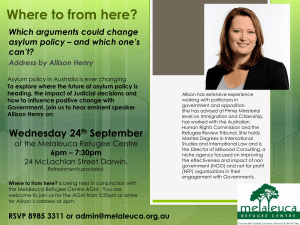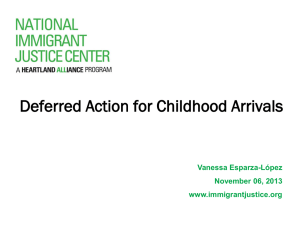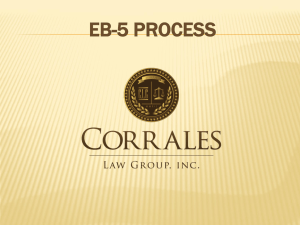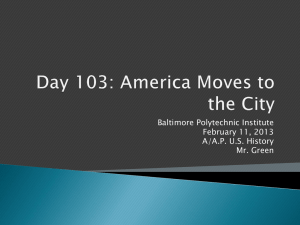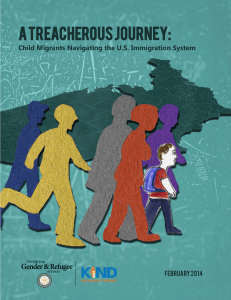Presentation
advertisement
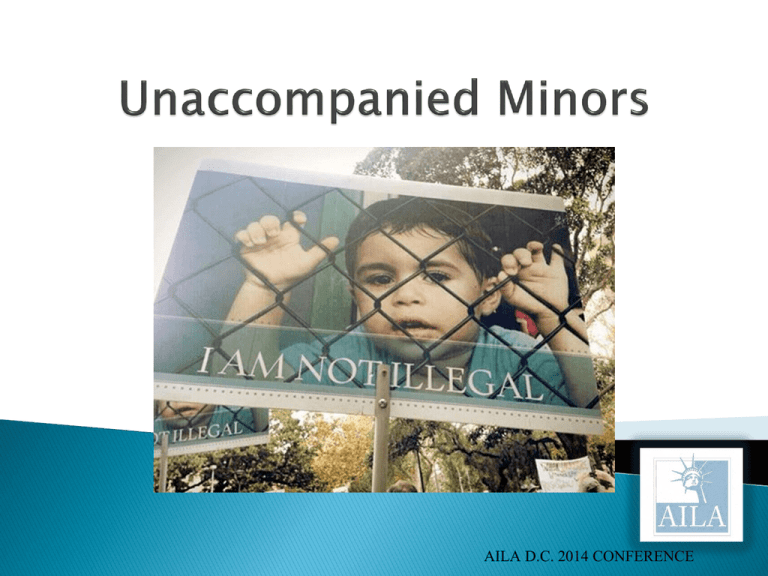
AILA D.C. 2014 CONFERENCE Michelle N. Mendez, Senior Managing Attorney Catholic Charities of the Archdiocese of Washington ILS A 1. 2. 3. Person who: has no lawful immigration status in the United States; is under the age of 18; and has no parent or legal guardian in the United States or no parent or legal guardian in the United States who is available to provide care and physical custody. 6 U.S.C. § 279(g)(2) How are UACs processed at the border? The Flores settlement agreement of 1997 establishes ORR custody over unaccompanied minors. The Homeland Security Act of 2002, Section 462, which extended the settlement terms to all unaccompanied minors, transferred responsibilities for the care and placement of UACs from the Commissioner of the thenImmigration and Naturalization Service (“INS”) to the Director of the Office of Refugee Resettlement by providing that ORR is to direct immigration functions related to “the care of unaccompanied alien children.” 6 U.S.C. §279(a) (emphasis added). DHHS must release the minor, in order of preference, to a parent, legal guardian, or an adult relative. 8 C.F.R. § Sec. 236.3. What is the custodian/sponsor’s role and what are their responsibilities? Legal Orientation Program for Custodians of Unaccompanied Minors (“LOPC”), a program created by TVPRA of 2008 and administered by EOIR Jennifer Bibby-Gerth, Attorney Catholic Charities of the Archdiocese of Washington ILS UACs Other minor principal asylum applicants Children who apply for asylum as derivatives of their parents I-589 Application for Asylum and Withholding of Removal http://www.uscis.gov/sites/default/files/files/f orm/i-589.pdf UACs and people who are not in removal proceedings: Mail I-589 to a USCIS Service Center In extenuating circumstances, I-589 may be submitted directly to the asylum office People in removal proceedings who are not UACs: Present I-589 to an Immigration Judge Past Persecution OR Well-Founded Fear of Future Persecution On Account of ◦ ◦ ◦ ◦ ◦ Race Religion Nationality Membership in a Particular Social Group Political Opinion Child Abuse Female Genital Mutilation Forced Marriage Forced Labor Targeting on account of their family membership Children who lack effective familial protection Close, nuclear family members of [Name] Family members of those who have fought against violent gangs in Guatemala by agreeing to be prosecutorial witnesses Sexual Minorities from [Country] Immigration Judge (Department of Justice) Asylum Officer (Department of Homeland Security) No No A 17-year-old university student who was admitted on an F-1 student visa, continues to attend school and comply with his visa, and applies for asylum after the arrest of his parents in Egypt A 15-year-old Salvadoran teen who entered the United States without inspection with her mother when she was 7-years-old, continues to live with her mother, and receives adequate care and support from her mother A 12-year-old Guatemalan girl who arrived in United States with her grandmother A 19-year-old Eritrean who presented himself at the Las Americas Port of Entry seeking admission to the United States A 16-year-old Ukranian boy who was admitted to the United States as a J-1 Exchange Visitor but who failed to report to the employer for whom he was admitted to work A 17-year-old Mexican teen who arrived in the United States with his father but whose father was later deported A Person who 1. 2. 3. has no lawful immigration status in the United States; is under the age of 18; and has no parent or legal guardian in the United States or no parent or legal guardian in the United States who is available to provide care and physical custody DHS CBP ICE USCIS EOIR ORR Normally, people in removal proceedings may only apply for asylum in front of an immigration judge. UACs can apply for asylum in front of USCIS. William Wilberforce Trafficking Victims Protection Reauthorization Act of 2008 (TVPRA), Public Law 110-457 Immigration Judges’ practices vary. A judge can Terminate removal proceedings Administratively close removal proceedings Grant a long continuance to allow USCIS time to complete its adjudication Schedule periodic Master Calendar Hearings while DHS makes a decision The UAC is an asylee and entitled to all asylee benefits. ◦ Refugee benefits include monetary assistance and health benefits. ◦ Asylees may file I-730 Relative Petitions for spouses and children but not parents. ◦ Asylees may apply for Lawful Permanent Residence after one year. The OCC or the UAC’s attorney will file a motion to terminate removal proceedings. Issued under two circumstances ◦ If the FBI Name Checks are not complete ◦ If there is an A file that is not in the possession of the asylum office Almost always result in a grant eventually Allow an applicant to apply for work authorization immediately but not access refugee benefits Asylum Headquarters must review any decision not to grant a minor principal asylum applicant and can overturn the decision If HQ concurs with the decision, the asylum claim is forwarded to the court and the UAC may pursue asylum in front of the immigration judge Removal Order The UAC can appeal to the Board of Immigration Appeals Refugee, Asylum, and International Operations Directorate RAIO Training Materials Asylum Division Training Programs Guidelines for Children’s Asylum Claims Policy Memoranda ◦ http://www.uscis.gov/about-us/directorates-and-programoffices/refugee-asylum-and-international-operations-directorate ◦ http://www.uscis.gov/about-us/directorates-and-programoffices/refugee-asylum-and-international-operationsdirectorate/raio-training-materials ◦ http://www.uscis.gov/humanitarian/refugeesasylum/asylum/asylum-division-training-programs ◦ http://www.uscis.gov/sites/default/files/USCIS/Humanitarian/Ref ugees%20%26%20Asylum/Asylum/AOBTC%20Lesson%20Plans/Gui delines-for-Childrens-Asylum-Claims-31aug10.pdf ◦ http://www.uscis.gov/laws/policy-memoranda Ref-World (country conditions research) ◦ http://www.refworld.org/ Useful Documents for Attorneys Representing Asylum Seekers ◦ https://www.immigrantjustice.org/useful-documentsattorneys-representing-asylum-seekers Immigration Equality Asylum Manual ◦ http://immigrationequality.org/get-legal-help/ourlegal-resources/immigration-equality-asylum-manual/ Gang Related Asylum Resources ◦ http://www.refugees.org/resources/forlawyers/asylum-research/gang-related-asylumresources/court-of-appeals.html Christina Wilkes, Esq., Grossman Law, LLC • • • • INA § 101(a)(27)(J), codified at 8 USC § 1101(a)(27)(J). 8 CFR § 204.11. Trafficking Victims Protection and Reauthorization Act (TVPRA) of 2008, Pub. L. No. 110-457, 122 Stat. 5044, Dec. 2008. (Effective March 23, 2009.) (*Regulations pending.) USCIS Memos • Donald Neufeld, TVPRA of 2008: SIJS Provisions, 03/24/09. • William Yates, Memorandum #3 – Field Guidance on SIJS Petitions, May 27, 2004. An immigrant present in the United States: (1) Who is under twenty-one (21) years of age; (2) Who is unmarried; (3) Who has been declared dependent on a juvenile court located in the US or whom such a court has legally committed to or placed under the custody of an agency or department of: a State, or an individual or entity appointed by a State or juvenile court located in the US; (4) Whose reunification with one or both of parents is not viable due to abuse, neglect, abandonment, or a similar basis found under State law; and (5) For whom it has been determined in administrative or judicial proceedings that it would not be in his/her best interest to be returned to his or his parent’s previous country of nationality or country of last habitual residence. • • • Federal law: 21 State law: It depends, but in most states 18. Maryland: 21 (Effective Oct. 1, 2014) • Chapter 96 (HB 0315) changed the definition of a child to “unmarried individuals under the age of 21 for purposes of custody or guardianship cases filed pursuant to a Motion For Special Immigrant Juvenile Factual Findings.” Such a person is an “immigrant child.” • A “juvenile court” is a court located in the US having jurisdiction under State law to make judicial determinations about the custody and care of juveniles. • Look at the Court’s function, not what the State labels it. • • TVPRA clarifies that a juvenile court may commit a minor to the care of State OR individual OR entity, thus guardianships and sole custody determinations are permissible. Note: for immigration, a child is “dependent” once the “juvenile court” accepts jurisdiction to determine care & custody. • State intervention (ie. foster care) is not required. • • • No federal definition: look to state law Abuse, abandonment and/or neglect may have occurred in the US or abroad. Child need not be in foster care to be SIJS eligible. Child may reside with and be cared for by 1 parent and still qualify for SIJS. No formal termination of parental rights is required, nor is a determination that reunification will never be possible. • • • • • Potential Evidence: TESTIMONY, affidavits, ORR records, foreign police reports and/or court records, foreign medical records, foreign home study, etc. Factors to Consider: No adult able or willing to care for the child in his/her home country Child would be forced to return to situation of abuse/abandonment/neglect Child would be forced to work and discontinue education Past threats or injuries by 3rd parties (ie. relatives, gangs, etc.) Establish jurisdiction in “Juvenile Court” in County of Child’s Residence •The Process Obtain SIJS Predicate Order from “Juvenile Court” File an I-360 Petition for SIJS w/ USCIS, along w/ Predicate Order. (File concurrent AOS for children not in proceedings.) Dismiss Immigration Court proceedings, file AOS w/ USCIS. SIJS Dos and Don’ts Is there a basis for State court jurisdiction? Do you have a “fit and proper” plaintiff/petitioner? Who abused or neglected the child? What is truly in the best interests of the child? What potential conflicts may arise between the adult and child? Can they be addressed? Are there other forms of relief? What if child wants to help the one parent? ◦ Read the Statutes: Family law, Trusts & Estates, etc. When do you file for custody? Guardianship? How does your jurisdiction define abuse? Neglect? Abandonment? Who are the parties & interested persons? Who do you represent? Who don’t you represent? What are your duties to the child’s parent(s)? ◦ Read the Rules of Procedure ◦ Read the Seminal Cases What factors will the Court apply to determine if the Plaintiff/Petitioner is fit & proper? When determining abuse (or neglect), will the Court apply US standards or those of the home country? What factors will the Court apply to determine the best interest of the child? ◦ Civil Procedure: Jurisdiction & Venue Service of Process (and Alternative Service) Deadlines “The importance of clerk smiling.” ◦ Evidence ◦ Know your county, your court, your judge, and your opposing counsel/party. ◦ SIJS Orders with pre-TVPRA of 2008 language ◦ Skeletal SIJS Predicate Orders In adjudicating the SIJS Petition, USCIS must determine that the SIJ benefit was not sought for the primary purpose of obtaining a “green card,” but rather to obtain relief from abuse, abandonment, or neglect. Children who are no longer dependent on the “juvenile court” when the I-360 is filed • • Draft a fact-specific order: EXAMPLES: “Manuel’s father is an alcoholic who physically abused Manuel. Because Manuel’s father was unemployed, Manuel dropped out of school after the 6th grade to work as a farmhand. Manuel’s mother is unemployed and unable to protect her children from her husband’s violence.” “There is no adult person in Honduras who is able and willing to provide Manuel with a safe and secure home and to ensure that his needs are met. In Honduras, Manuel would be subjected to further abuse and neglect from his parents, and he would have to work full-time in lieu of attending school.” ◦ Avoid Master Calendar Hearings ◦ I-360s Pending Over 180 days ◦ Become familiar with the PerezOlano Settlement Agreement: In Absentia Orders of Removal “Age out” cases Take a pro bono case from Catholic Charities! CC has extensive experience in these cases and will provide sample filings, mentorship, contacts, insider tips, etc. in exchange for you taking a pro bono case. Contact Catholic Charities Pro Bono Coordinator Jim Feroli at james.feroli@catholiccharitiesdc.org Michelle N. Mendez Catholic Charities of Washington Immigration Legal Services 924 G Street NW Washington, DC 20001 Tel: (202) 772-4342 Jennifer Bibby-Gerth Catholic Charities of Washington Immigration Legal Services 12247 Georgia Avenue Silver Spring, MD 20903 Tel: (301) 942-1790, Michelle.Mendez@catholicc ext 135 haritiesdc.org Jennifer.Bibby@catholic charitiesdc.org Christina Wilkes Grossman Law, LLC 110 N. Washington St. #350 Rockville, MD 20850 Tel: (240) 403-0913 Christina@grossmanlawllc.com
